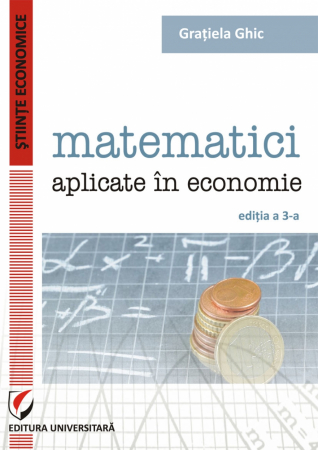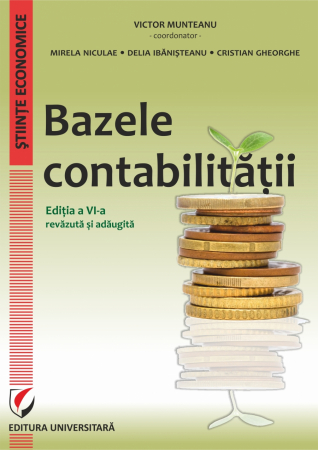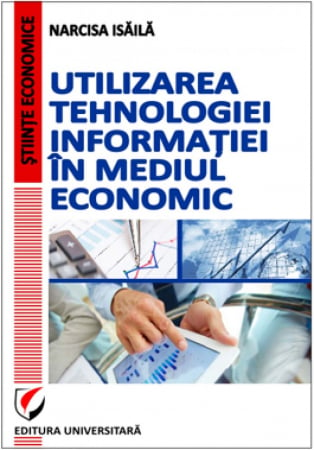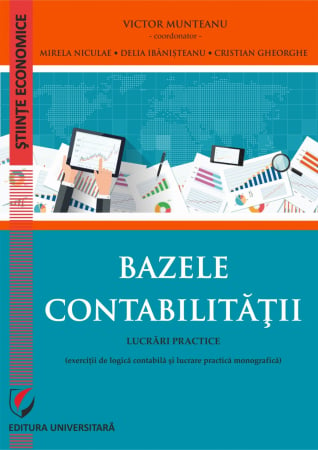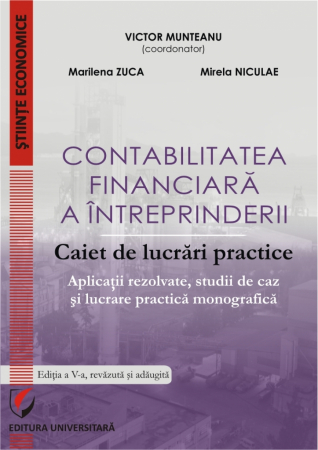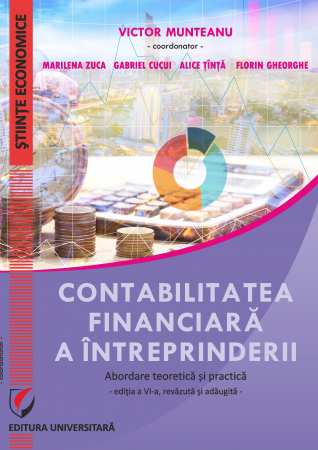ISBN: 978-606-591-415-5
DOI: 10.5682/9786065914155
Publisher year: 2012
Edition: I
Pages: 302
Publisher: Editura Universitară
Author: Sorin Claudiu Radu, Dan Marin Boajă
- Description
- Download (1)
- Authors
- Content
- More details
- Reviews (0)
There is an organic relationship between the financial system and the financial markets: at least in the market economy, the relations between the different financial institutions are realized through the financial markets. Discussions related to financial systems are subscribed to various thematic areas, starting from their structure or functions, to their optimal architecture, based on banking companies or on the capital market. Thus, we discuss financial systems based on banking companies or capital markets, trying to offer an optimal solution, financial systems that ensure a high or low level of protection of minority shareholders, etc.
The financial market comprises institutions and procedures that facilitate the transfer of financial resources between agencies that have surplus resources and those that face deficits in such resources. In a simpler formulation, financial markets are the necessary framework for trading financial instruments.
From certain points of view, in order to be successful investing in the financial market, you must have extensive knowledge, reason to allocate significant time to training in the field. From the perspective of the uninitiated, the members of this group of professionals know everything that happens on the financial market, and hence the inability of those who do not have a training in the field to perform optimal transactions, to earn a lot of money at stake. From another point of view, the financial market is a real "El Dorado", a place where anything can happen to you, from becoming "overnight" rich to losing all your money. From this perspective, anyone could act on the financial markets, because the fundamental instinct is to adapt and win and, perhaps not negligible, luck, this approach creates great difficulties for the development of financial markets in the start-up periods, such as for example the case of many ex-communist countries, such as Romania. Naive investors are attracted to the market, who confuse the market and often make it impossible for it to develop coherently. At the same time, investors who make rational decisions may incur opportunity costs due to the fact that the period in which market prices return to fair levels in terms of valuation is longer.
In another dimension, financial market theorists point out that they represent a necessary framework for the functioning of the market economy, offering holders of available capital the opportunity to allocate them in the most efficient way to ensure the development of the entire economy. Thus, the agencies that have excess liquidity (private investors, insurance companies and investment funds in the first place) make them available to those who promote attractive business ideas or investment projects, but who do not have these liquidities (enterprises). This transfer of funds is made on the financial market.
-
Pieţe de capital. Instituţii şi instrumente financiare tranzacţionate
Download
DAN MARIN BOAJA
Chapter 1
FINANCIAL MARKET / 11
1.1. General aspects regarding the financial market / 11
1.2. The role of the financial market / 17
1.3. Consequences of capital movements on national economies / 21
Chapter 2
CAPITAL MARKET - CONTENT AND CHARACTERISTICS / 24
2.1. General aspects regarding the capital market / 24
2.2. The role of the capital market / 26
2.3. Capital market configuration / 27
2.3.1. Capital market segmentation / 29
2.4. The premises for the appearance and development of the capital market in Romania / 34
2.5. Romanian capital market institutions / 51
Chapter 3
SECURITIES - FINANCIAL INSTRUMENTS TRADING ON THE CAPITAL MARKET / 57
3.1. General aspects regarding the financial instruments traded on the regulated markets / 57
3.2. Actions / 61
3.2.1. Types of actions / 62
3.2.2. Rights generated by the issue of shares / 69
3.3. Obligations / 72
3.3.1. Types of bonds / 73
3.4. Securities issued by public authorities / 74
Chapter 4
ISSUE AND EVALUATION OF SHARES AND OBLIGATIONS / 81
4.1. Issue of shares / 82
4.1.1. Advantages and disadvantages of listing shares / 91
4.2. Value of a share / 95
4.3. Fundamental evaluation of actions / 97
4.4. Issue of shares, capital increases and protection of the rights of old shareholders / 99
4.5. Issuance of bonds / 103
4.6. Valuation of bonds / 106
Chapter 5
BUCHAREST STOCK EXCHANGE / 111
5.1. General aspects regarding the establishment and evolution of BVB / 111
5.1.1. History BVB / 114
5.1.2. Stock market actors / 126
5.2. BVB / 127 trading system
5.2.1. Participants in the trading system of BVB / 136
5.2.2. Types of orders / 140
5.2.3. Market conditions / 149
5.3. RASDAQ / 151 electronic exchange
Chapter 6
SC SIBEX - SIBIU STOCK EXCHANGE S.A. / 154
6.1. Appearance and development of the Sibiu Monetary-Financial and Commodity Exchange SA / 154
6.2. Trading system / 156
6.2.1. Participants in the trading system of BMFMS / 160
6.2.2. Types of orders / 164
6.2.3. Market conditions / 166
6.3. Derivative financial instruments traded on SIBEX / 167
6.3.1. Future contracts / 167
6.3.2. The futures trading mechanism / 172
Chapter 7
STOCK EXCHANGE TRANSACTIONS / 177
7.1. General aspects / 177
7.2. Types of stock exchange transactions / 181
7.2.1. Margin transactions / 185
7.2.2. Sight transactions / 195
7.2.3. Forward transactions / 208
Chapter 8
NATIONAL AND INTERNATIONAL STOCK EXCHANGE INDICES / 211
8.1. General aspects regarding stock market indices / 211
8.1.1. Assessment of stock market activity using stock market indices / 214
8.1.2. Classification of stock market indices / 216
8.2. Representative stock market indices for the Romanian market / 224
8.2.1. Bucharest Stock Exchange Indices / 224
8.2.2. SIBEX / 251 indices
8.3. Representative stock indices for international markets / 253
Chapter 9
CAPITAL MARKET INVESTMENT DECISION / 260
9.1. The characteristics of the investment activity on the capital market / 260
9.2. Market model of securities profitability and risk / 262
9.2.1. Securities risk / 263
9.3. Methods for determining the cost of equity / 265
Chapter 10
THE ROLE OF GLOBALIZATION IN THE EVOLUTION OF FINANCIAL MARKETS / 279
10.1. Globalization and its effects on the internationalization of financial markets / 279
10.2. Benefits and risks of the economic nature of financial globalization / 283
10.3. The impact of globalization on the capital market / 286
10.4. Relaunching the world economy after the great recession of 2008/292
Bibliography / 299
According to the approach presented in the Dictionary of Economics (Dobrota 1999), the financial market is defined as the meeting place of the needs of financial resources of entrepreneurs with the financial availability of the population or other economic agents. In other words, the financial market represents the space that ensures the harmonization between the demand and the supply of financial resources.
There is an organic relationship between the financial system and the financial markets: at least in the market economy, the relations between the different financial institutions are realized through the financial markets. Discussions related to financial systems are subscribed to various thematic areas, starting from their structure or functions, to their optimal architecture, based on banking companies or on the capital market. Thus, we discuss financial systems based on banking companies or capital markets, trying to offer an optimal solution, financial systems that ensure a high or low level of protection of minority shareholders, etc.
The financial market comprises institutions and procedures that facilitate the transfer of financial resources between agencies that have surplus resources and those that face deficits in such resources. In a simpler formulation, financial markets are the necessary framework for trading financial instruments.
From certain points of view, in order to be successful investing in the financial market, you must have extensive knowledge, reason to allocate significant time to training in the field. From the perspective of the uninitiated, the members of this group of professionals know everything that happens on the financial market, and hence the inability of those who do not have a training in the field to perform optimal transactions, to earn a lot of money at stake. From another point of view, the financial market is a real "El Dorado", a place where anything can happen to you, from becoming "overnight" rich to losing all your money. From this perspective, anyone could act on the financial markets, because the fundamental instinct is to adapt and win and, perhaps not negligible, luck, this approach creates great difficulties for the development of financial markets in the start-up periods, such as for example the case of many ex-communist countries, such as Romania. Naive investors are attracted to the market, who confuse the market and often make it impossible for it to develop coherently. At the same time, investors who make rational decisions may incur opportunity costs due to the fact that the period in which market prices return to fair levels in terms of valuation is longer.
In another dimension, financial market theorists point out that they represent a necessary framework for the functioning of the market economy, offering holders of available capital the opportunity to allocate them in the most efficient way to ensure the development of the entire economy. Thus, the agencies that have excess liquidity (private investors, insurance companies and investment funds in the first place) make them available to those who promote attractive business ideas or investment projects, but who do not have these liquidities (enterprises). This transfer of funds is made on the financial market.
In a broad sense, the structure of the financial market includes: money market, capital market, foreign exchange market, mortgage market, insurance market, and in a narrow sense, it includes two main components: money market and capital market, their share being different from one country to another. In turn, the money markets include: the interbank market, the discount market, the securities market, the deposit certificates market, the eurocurrency market, etc., while the capital market is composed of: the stock market, the bond market, the derivatives market forward, futures, options) etc. Financial theory in Romania has not yet crystallized a definition for the concept of financial market, unanimously recognized. The different definitions associated with this concept bear the imprint of the school of which its theorists belong or, more specifically, of the school from which the authors who introduced the term in Romanian were inspired.
The specialized literature approaches the structure of the financial market based on two major concepts: the Anglo-Saxon conception and the continental-European conception (of French origin).
In the Anglo-Saxon vision, the financial market is a concept with a wider scope, with three components, namely the money, capital and insurance markets. In this sense, the money market attracts and places short-term capital through markets such as interbank, discount, certificates of deposit, euro-currencies, etc.
The capital market is defined as the securities market that ensures medium and long term investment, where shares and bonds are traded, but, by assimilation, including firm and conditional forward contracts.
The insurance market has certain specific features that individualize it: insurance products can be seen in their quality both as a means of saving, and as a means of compensating for losses incurred following the occurrence of a bad insured event.
In this context, the capital market is synonymous with the market of financial instruments that ensure the investment of capital in the medium and long term. In contrast, the money market attracts and places short-term capital through the interbank market, the discount market, the securities market, the deposit certificates market, the Eurocurrency market, etc. Thus, the capital market is considered to be the component of the financial market where long-term securities are issued and traded, while the money market, the other component of the financial market, is the market where short-term securities are issued and traded.

6359.png)
![Capital markets. Institutions and financial instruments traded [1] Capital markets. Institutions and financial instruments traded [1]](https://gomagcdn.ro/domains/editurauniversitara.ro/files/product/large/piee-de-capital-instituii-i-instrumente-financiare-tranzacionate-1707-181041.jpg)



